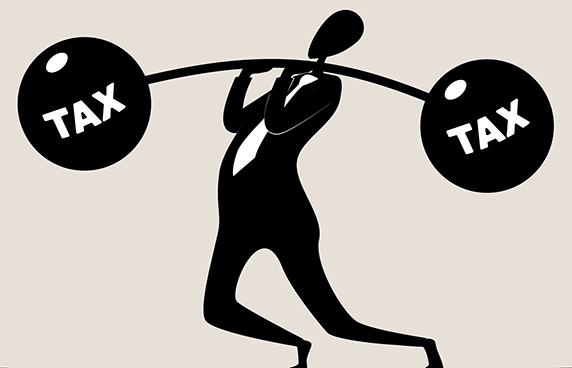State Lawmakers Push Business Tax Hikes

The legislature’s Finance, Revenue, and Bonding Committee this week reviewed a proposed bill that features at least six separate tax hikes on businesses and job creators.
HB 5673 is being pushed by a coalition of progressive lawmakers, including state Reps. Brandon Chafee (D-Middletown), Josh Elliott (D-Hamden), Kate Farrar (D-West Hartford), Anne Hughes (D-Easton), Robyn Porter (D-New Haven), and Gary Turco (D-Newington).
The legislation is co-sponsored by state Senators Julie Kushner (D-Danbury) and Derek Slap (D-West Hartford) and Reps. Jillian Gilchrest (D-West Hartford), Bob Godfrey (D-Danbury), David Michel (D-Stamford), Amy Morrin Bello (D-Wethersfield), Corey Paris (D-Stamford), and Travis Simms (D-Norwalk).
“Connecticut employers, particularly small businesses, continue to face a multitude of challenges,” CBIA’s Eric Gjede told the committee Feb. 27.
“Most businesses have seen operating costs increase due to supply chain issues and inflation. An astounding 80% of businesses continue to face workforce issues.
“If you want Connecticut to have the least competitive business climate in the United States, pass HB 5673.”
Tax Hikes
The bill—technically a concept rather than fully drafted legislation—imposes the following tax hikes:
- 5% surcharge on the net gain or sale of capital assets and on dividend and interest income—harming those who invest in businesses that drive job creation.
- 10% tax on major internet businesses that receive revenues from digital advertising services. The key problem, of course, is that those taxes are passed down to Connecticut’s smallest businesses that need internet advertising to be competitive with larger businesses.
- Statewide property tax of 2 mills on commercial and residential properties with an assessed value of more than $1.5 million—impacting most commercial properties in the state.
- Increases the state’s 7.5% corporate tax rate to 11.5%.
- Increases the “temporary” corporate surcharge on certain businesses from 10% to 20%.
- Creates new income tax rates of 9.55%, 10.25%, and 10.65%. Connecticut’s current top income tax rate is 6.99%.
‘Why?’
While no fiscal note has yet been attached to the bill, the proposals when taken together represent billions of dollars in tax hikes on businesses—small and large.
The question on the minds of those testifying at the public hearing was “Why?”
Connecticut’s fiscal health is the strongest in decades, with a maximum $3.3 billion in the state’s rainy day fund and a projected $3.2 billion surplus for this year, the second-largest in history.
The proposals represent billions of dollars in tax hikes on businesses—small and large.
That fiscal strength stems from the bipartisan budget reforms adopted by the legislature in 2017 that were set to expire on June 30.
Caps on spending and borrowing, along with using surplus dollars to help pay down the state’s long-term liabilities, has benefitted the state and improved its economic trajectory.
The reforms also provided the foundation for Gov. Ned Lamont’s proposed two-year, $50.5 billion budget, featuring more than $500 million in middle-class tax relief, the first significant income tax cuts in the state’s history.
Fiscal Discipline
National studies, such as CNBC’s America’s Top States for Business, already note the high costs of living and doing business in Connecticut.
CNBC’s 2022 business climate study ranked Connecticut the eighth costliest state to live and the sixth most expensive place to run a business.
Both metrics represent significant barriers to economic growth and contribute heavily to Connecticut’s worker shortage crisis.

The Tax Foundation ranked Connecticut’s tax system 47th in the country in its 2022 State Business Tax Climate Index.
Adding a multitude of new taxes that will ultimately impact the cost of goods and services only exacerbates Connecticut’s affordability issues.
As CBIA president and CEO Chris DiPentima wrote in a Feb. 21 opinion piece in The Day of New London, “we have an historic opportunity to take advantage of Connecticut’s sound fiscal health.”
“The discipline that delivered a maxed out rainy day and a series of record budget surpluses is the right blueprint to shape Connecticut’s future prosperity and must continue to define our fiscal approach,” he wrote.
For more information, contact CBIA’s Eric Gjede (860.480.1784) | @egjede.
4 thoughts on “State Lawmakers Push Business Tax Hikes”
Leave a Reply
RELATED
EXPLORE BY CATEGORY
Stay Connected with CBIA News Digests
The latest news and information delivered directly to your inbox.



This is one more reason (on top of a mountain of reasons) to relocate. I own a small manufacturing company that employs 15 people, and despite this state’s excessive taxes and regulations, we have done well for ourselves. However, I would rather partner with a state that does not view my company as a piggy bank or as an enemy. Tennessee and Florida look very attractive right now.
A great example of biting the hands that feed you. I am closing my 70 year old business in Connecticut this year with the Democrats sponsors of this bill being the primary reason.
are the Lawmakers in this State completely out of touch.
Real world in this state, as a small business owner, is we are taxed too much. almost to a point where it is not worth staying in CT.
Couple this legislation with the proposed expansion of Paid Medical leave and this state is racing towards the bottom.